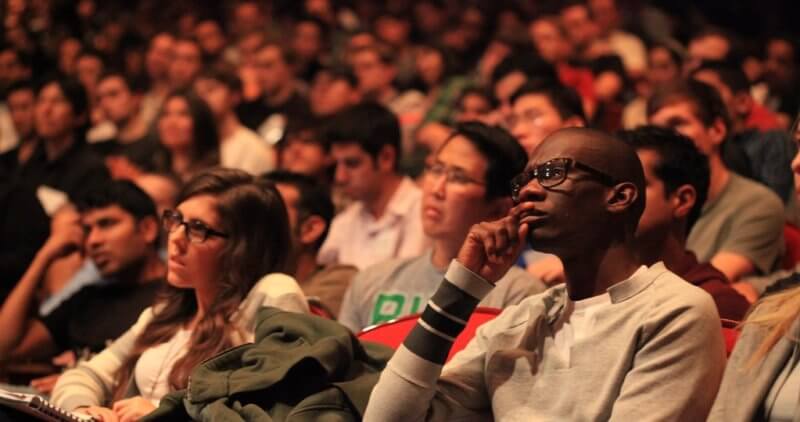Screen These Timely MEF Films During the New Semester

PHOTO BY ROBERT SCOBLE / CC BY 2.0
As the new semester gets under way, we want to call your attention to six MEF videos that speak directly to urgent contemporary issues. Ranging from gender violence and the politics of racial scapegoating to the corporate colonization of the internet and the compromised state of American journalism, these six videos take on tough topics in accessible, engaging ways. We encourage you to use them in your classes, organize screenings on your campus, and share them with your colleagues to spark discussion and debate during the new semester. Please take a minute to browse these titles below.
1. ROBERT SCHEER – ABOVE THE FOLD
Robert Scheer – Above the Fold profiles legendary activist and journalist Robert Scheer, reminding us that journalism, at its best, is about pursuing the truth at all costs. The film traces Scheer’s career trajectory across dramatic shifts in journalistic practice and platforms, offering a glimpse into the myriad pressures that confront journalists who refuse to compromise their principles and instead commit themselves to speaking truth to power. At a time when debates about “fake news,” “filter bubbles,” and the dumbing down of commercial news media have moved to the center of mainstream discussion, Robert Scheer – Above the Fold is an ideal teaching tool for courses that examine journalism, politics, and the hypercommercialization of media. Features Norman Lear, Jane Fonda, Arianna Huffington, Daniel Ellsberg, and others.
2. THE BYSTANDER MOMENT
The Bystander Moment, featuring pioneering educator and activist Jackson Katz, explores how bystanders can help disrupt attitudes, beliefs, and behaviors that perpetuate sexual harassment, abuse, and other forms of gender violence. Ranging from peer cultures to popular culture to the highest levels of our political culture, Katz examines how social norms – in particular normative ideas about manhood across race, class, and ethnicity – have fed a culture of silence in the face of men’s sexual violence. At the same time, he offers a positive conception of bystanders as friends, teammates, classmates, and co-workers who have a crucial leadership role to play in challenging and changing these social norms. By appealing to viewers as potential leaders rather than potential perpetrators, The Bystander Moment offers a practical and ultimately hopeful blueprint for transforming the culture of abuse.
3. DIGITAL DISCONNECT
In Digital Disconnect, renowned media scholar Robert McChesney trains his sights on the corporate threat to the internet. With astonishing clarity, McChesney tells the story of how internet giants like Google and Facebook have amassed huge profits by surreptitiously collecting personal data and selling it to advertisers; details how telecom monopolies like Verizon have colluded with the national security state to advance online mass surveillance programs; and breaks down how a handful of powerful social media platforms has worked to isolate people into ideological filter bubbles and elevate “fake news” at the expense of real journalism. An indispensable tool for raising awareness about the contentious relationship between unchecked corporate power and the democratic need for a free and open media system.
4. THE GREAT WHITE HOAX
The Great White Hoax, featuring acclaimed anti-racist educator and author Tim Wise, looks at the long history of racial scapegoating in American politics. From Nixon’s Southern Strategy in the 1960s to Charlottesville in 2017, the film offers a stunning look at how conservative politicians within both parties have stoked white anxiety and resentment and scapegoated people of color to divide and conquer working class voters. While the film’s primary focus is Donald Trump’s 2016 run for the presidency, it widens its scope to show how Trump’s divisive campaign rhetoric about African-Americans, Latinos, and Muslims fits within a longstanding historical pattern of racial scapegoating that cuts across partisan lines and goes back decades in American politics. A powerful classroom resource that helps makes sense of the increasingly angry backlash against immigration, multiculturalism, and progressive social change.
5. THE GREAT WHITE HOAX
Latinos Beyond Reel draws on the insights of Latinx scholars, journalists, news producers, actors, directors, and community leaders to break down the long, destructive history of Latino stereotyping in the United States. Ranging across decades of news and entertainment media, the film brings us face to face with a steady stream of Latino gangsters and Mexican bandits, harlots and prostitutes, drug dealers and welfare-leeching illegals. It also shows how, at key moments in American history, these pathological and one-dimensional media narratives have contributed to anti-Latino attitudes, a toxic political culture, and repressive public policies. At a time when the dehumanization of Mexicans and Latino immigrants has become routine at the highest levels of power in the U.S., Latinos Beyond Reel challenges viewers to build counter-narratives that do justice to the diversity and humanity of Latinx people.
6. ADVERTISING AT THE EDGE OF THE APOCALYPSE
In Advertising at the Edge of the Apocalypse, media scholar Sut Jhally argues that we’re not likely to avert the coming climate catastrophe without first confronting the cultural power of the advertising industry. Ranging from the birth of modern advertising in the early 20th century to the full-scale commercialization of the culture today, Jhally identifies one consistent message running throughout all of advertising: the idea that corporate brands and consumer goods are the keys to human happiness. He also shows how this powerful narrative, backed by billions of dollars a year and propagated by the best creative minds, has blinded us to the catastrophic environmental costs of ever-accelerating rates of consumption. The result is a powerful intervention in current debates about climate change and environmental collapse.

